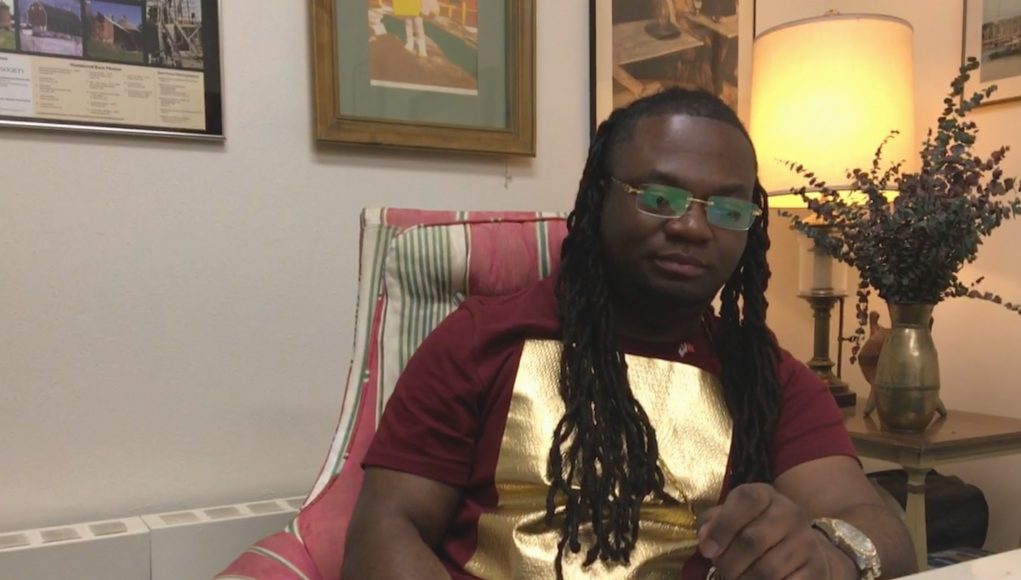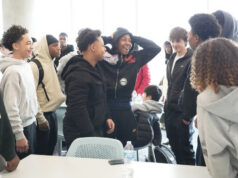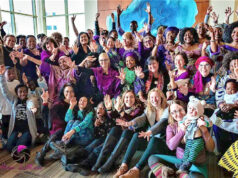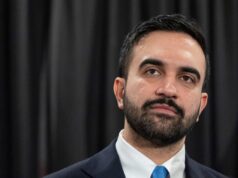“One week in jail could have yielded the same result from me. I could have lost my job and my livelihood in one week … based upon somebody making allegations,” says Caliph Muab-el. “It happens all the time.”
Muab-el is talking about crimeless revocation, the practice of re-incarcerating individuals on probation, parole, or extended supervision for minor rule violations. The community leader and outspoken activist for prison reform was recently a victim of it. He was imprisoned by the state of Wisconsin starting Feb. 7 for much more than one week – 6 long months, actually – based upon a third-party accusation that was never proven. And it turned his life upside down.
It’s well documented how much mass incarceration has devastated families, neighborhoods, and communities throughout the United States. And crimeless revocation, especially here in Wisconsin, has helped play a key role in that. According to a report from Human Impact Partners, thousands of people are sent to prison each year in Wisconsin without breaking the law and estimates suggest that across the U.S., half of the people in jails and more than one-third of the people entering prison are locked up for a revocation.
“This is a common theme in Wisconsin. This is not just a Caliph Muab-el situation. This is a situation that happens all the time across the board,” Muab-el tells Madison365 at his Breaking Barriers headquarters in downtown Madison. “This is how the system is designed. If you’re on parole, allegations are sufficient enough to send you back to prison and for you to lose your life, liberty, and everything else.”
Muab-el lost all of that and two jobs while he was in prison for 6 months after the mother of his child made a variety of allegations against him. He got out last month with help from some pressure from community members and activists.
“It put me in a much worse position than when I started,” he says, “all over allegations.”
Critics say that Wisconsin’s revocation policies lead to the unnecessary incarceration of thousands of men and women each year and disproportionately harm people of color and people with disabilities, tear families apart, disrupt communities, and drain resources that could instead be used to build safer and stronger communities.
“Being on paper, I’m susceptible to any allegation and I’m guilty until proven innocent,” Muab-el contends. “Being an advocate and being outspoken and an aggressive activist … being an organizer that doesn’t compromise, it makes me a threat to those who do. I tend to stick out like a sore thumb.
“But nothing is ever going to change if we keep compromising and we keep selling out. I just can’t be a part of that,” he adds. “I see things differently.”
Revocation without conviction disproportionately affects African-American and Native American communities, as well as people with mental illness, according to the aforementioned Human Impact Partners report. About 2,700 Wisconsin children have a parent sent to prison each year without having been convicted of a new crime and Wisconsin taxpayers pay $147 million per year for these revocations.
Muab-el knows that he would probably still be in jail right now, if he hadn’t received so much community support. In that aspect, he was lucky compared to the thousands that are still incarcerated right now for crimeless revocation.
“Most people in there right now don’t have that support. Many with single allegations similar to mine. Some even with a lot weaker than mine,” Muab-el says. “But there are no advocates for these people. So, the DOC is really funneling these people through the system. It amazes me how many people are sitting there in the County Jail awaiting revocation when the prison capacity is 11,000 in the state of Wisconsin but they are almost double the capacity now.
“They are doing this instead or pursuing alternatives to incarceration for people who have lightweight crimeless revocations and haven’t committed new crimes. It costs a lot less to treat those people in the community,” he adds. “Why not invest in those people so that they don’t go back through the system and have these overcrowded situations?”

Muab-el, who is the co-founder of the Focused Interruption Coalition, which is focused on responding to and reducing gun violence, and the founder of Breaking Barriers Mentoring, which works to empower youth facing societal barriers by nurturing diverse mentoring relationships and community support, said that his recent six-month stint in corrections “came down to a string of crazy allegations from his child’s mother.”
“I could not believe it,” Muab-el says. “I have joint custody and partial placement of my son. She married my blood brother who is in prison and she moved to Waupun to be able to visit him more frequently. What that did was cut me out of the middle and I can’t see my own son. He just turned 6.”
Muab-el says that she was refusing to let him see his own child.
“I went to court and as a result of that, she went to the authorities three days later making allegations against me,” Muab-el says. “Her first allegation had a lot of holes in it so she tried to pile up a bunch of allegations on behalf of other people forging their names and letters and gave them to authorities who had to investigate everything. They found out that some of these people never even heard of me.
“It was crazy,” he adds. “I had a visit with my parole officer and as I went into the meeting, I was taken into custody.”
The allegation by his child’s mom have happened before, he says.
“This is a perpetual cycle. The bottom line is: She doesn’t want me to have frequent access to my son and she doesn’t want to accommodate visitation,” he says. “Even with court orders telling her she has to comply with such-and-such orders, she feels like she doesn’t have to. She knows that I’m in a vulnerable position being on parole and all she has to do is make an allegation that will potentially send me back to prison.
“The DOC doesn’t really care about whether it’s true or a fact; they care about the allegation. Basically, I am guilty until proven innocent,” he adds. “But the District Attorney denied prosecution in the first claim because it was crazy. For the first two months I sat there, I didn’t even know why I was there. I didn’t know what the claim was about. I had no idea what was going on. I was like ‘why am I sitting here?’”
Mistakes from his youth growing up in Chicago – things that happened over two decades ago – have landed Muab-el in the situation where he is – and unless something changes – will always be – on parole and susceptible to crimeless revocation. Muab-el is very open about the mistakes he made as a youth and sometimes uses those experience to talk to young people about the importance of making good decisions.

“The DOC still refers to me as a violent offender. Even though I haven’t perpetuated an act of violence in over 17 years and that was in response to a guard spitting in my face,” he says.
“The last time I committed a crime in the community I was 15 years old. The last felony conviction was when I was 19 years old – battery by prisoner. A prison guard spit in my face and called me the N-word and I punched him,” Muab-el adds. “That was the right after the death of my mother, my grandmother and my cousin. They gave me the maximum of 10 years.
“My parole now is standing from that still,” he continues, “from an incident that happened while I was in custody at the DOC. I was 19. I’m 36 now. I’ve been on paper since I was 12 years old non-stop.”
On the plus side, Muab-el says that he doesn’t think it will be easy for his child’s mother to do this again.
“But it will still be out there always as a possibility,” he says. “When you’re dealing with people who are vindictive like that, you can’t underestimate them.”
And that’s a very terrifying thing.
“Yes, sir. It is terrifying for me,” he says. “This is the only state that does that with these allegations. Every state has done away with that kind of practice.”
The reason that Muab-el is a free man right now is due in strong part to members of various Madison-area faith and civic communities – led by EXPO (EX-incarcerated People Organizing), along with MOSES, WISDOM, the ACLU and the Gamaliel Network – who came out for Muab-el and put pressure on the system.

“I’m living proof of what people can accomplish. If the community did not mobilize itself to be a force to be reckoned with on my behalf in advocacy, I guarantee you that I would be going back to prison for three and a half years for something I didn’t do,” he says. “I guarantee you that would have been the case.
“All eyes were on the system and the system saw that this is not somebody that we can do just anything with … and support came from all over the country and even people overseas,” he adds. “For me, it was a moment of complete vindication.”
Although he is out now, he knows that a lot of people are still in jail because of crimeless revocation. Incarcerating people for allegations or technical violations is destroying thousands of lives, Muab-el says, and is contributing to the massive overcrowding in jails. It also costs taxpayers quite a bit. The community has a responsibility to address this, he says, in what he labels an “[in]justice system.”
“The community’s silence is betrayal. When the people in there don’t feel like they are supported by the community, they don’t have a problem coming out and perpetuating violence against the community or becoming predators against the community,” Muab-el says. “Investing in people is one way to get them on your side. And it’s also one way to inspire people to go the right way.”
It’s definitely a public safety issue, he adds.
“When you aren’t investing in people and instead you are just punishing people, the only thing that they are going to remember is the punishment,” he says. “And that is going to cause them to feel bitter. And that bitterness turns into anger and resentment and then they get become closed. And once they become closed off, there are very few people and things that can get through to them.
“I’m just surprised about the overall lack of concern for these issues,” he adds. “There’s a ripple affect for every single body that is in that County Jail or in that prison system through their families and they will feel it. That’s a sad reality. This issue needs to be talked about more and it needs to be addressed. It needs to be mainstream conversation.”
Muab-el is picking up the pieces after his six months in jail. He recently severed all ties with Focus Interrupted Coalition, which he helped name, found, and build.
“We started with a set of values as community grassroots leaders and we wanted to make a difference in the community and we wanted to revolutionize the stigmatism and the image of grassroots leadership,” he says. “We also wanted it to come from the voices who are voiceless in the community – the people who were never recognized at the table. We wanted to put them into positions to advocate for themselves and to enhance the vitality of the work they were doing.
“But we got away from it. It, for me, has become more of the same. I see things differently and I don’t want to be bogged down by any system,” he adds. “I don’t want to face oppression against my people and I’m not going to fight with them. So I severed ties with them and I wish them all the best … but I’m going to launch something new. The good thing about being an organizer with a lot of respect in the community is that I can reboot and restart and start this whole thing all over again and I know it will be successful.”
So, what’s that going to be?
“It’s in alliance with violence prevention but it’s going to be intensified and it’s going to be representative of what I initially envisioned for FIC,” he says. “We’re going to bring that to fruition within 3-6 months.”

In the meantime, Muab-el will continue his fight against mass incarceration and the destruction it brings to people’s lives.
“My grandfather was in prison. My father was in prison. I was in prison. My brother under me was in prison. My other brother was in prison,” he says. “There was one point when we were all in prison together at the same time and we were writing and corresponding with each other while in prison.
“This is something that was by design. I know that we are targeted as people,” he adds. “Being put in a second-class state as part of a caste system, it makes it really difficult to navigate through the systemic things and barriers we have to success.”
Muab-el adds that we always look at the effect; we never look at the cause. “You put low-income jobs in low-income neighborhoods, where is the vitality at?” he asks. “And then, if everybody in this environment is sick and the city and the county isn’t investing any dollars to reform communities and to create or erect community centers or funnel resources for second-chance programs.
“If there is a blatant and utter disrespect for human life and an indifference in particular areas that are not concentrated on development than of course those things will go under ruin and you can bet that those people are going to become so upset, so angry, so depressed, that they are going to start to become predators,” he adds. “Hopelessness will perpetuate from generation to generation. What are we really doing to change this?”










